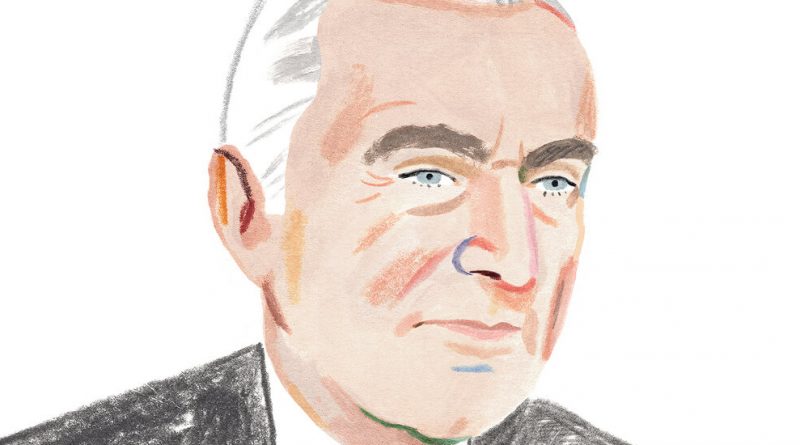Bill Bratton Doesn’t Root for the Bad Guys
[ad_1]
What book might people be surprised to find on your shelves?
Hilary Mantel’s “Wolf Hall” trilogy. The story of Henry VIII and his chief minister, Thomas Cromwell; the country’s breaking away from the papacy, and the creation of the Church of England. Talk about difficult books; she almost spoke a different language. I had to read it in hardcover because, with its long titles and many archaic English phrases, I had to keep going back and checking the names. Couldn’t do that easily on a Kindle!
What’s the best book you ever received as a gift?
“Your Police,” by George Zaffo, was a nonfiction young adult book filled with colorful illustrations of the 1950s N.Y.P.D. As a boy, I didn’t know any cops — no one in my family was a cop — but between “Dragnet” on TV and so many ’50s black‐and‐white movies in theaters, policing was all I truly cared about. Here were squad cars and motorcycles, as well as all the paraphernalia every officer carried with him on the New York streets. I saw call boxes, helicopters, emergency vehicles — a full complement of real objects to fulfill a fantasy. It said: “We must always remember that wherever you see a policeman, he is your friend. He is there to protect you. … He would not hesitate to save your life at the cost of his own.” I took that book out of the library regularly for years. Sometimes I would just walk over and visit it. In 1991 friends found a copy in a secondhand shop and without knowing my attachment to it, thought, “This would be a nice book for Bill Bratton.” I had not seen it since the 1960s. Brought me right back. After I used that copy during my 2014 swearing-in as N.Y.P.D. commissioner, the author’s son came to my office and brought me another plus some of the original photos upon which the drawings were based. I am saving them for my grandsons.
Who is your favorite fictional hero or heroine? Your favorite antihero or villain?
Michael Connelly’s L.A.P.D. homicide detective Harry Bosch is my favorite hero. He is a flawed person, which makes him real. There’s both a vitality and a morose quality to Harry; you’re rooting for him even when he acts out against his better judgment. You want him to win because he truly stands up for justice. I don’t have a favorite villain.
What kind of a reader were you as a child?
I read avidly, all the time. When I was a boy in Dorchester, at the corner of Arcadia Street a beautiful red brick building housed my two passions: Boston Police District 11 and a branch of the Boston Public Library. I lived at that library.
If you could require the president to read one book, what would it be?
With all due respect, two of them: my books “Turnaround” and “The Profession,” both written with Peter Knobler. I think in order to keep the country safe and headed in the right direction it’s important that our chief executive have a strong awareness of the history and character of policing and law enforcement. There’s so much misunderstanding about the role and potential of our profession, and a president would do well to have a clear vision going forward. I would also recommend Doris Kearns Goodwin’s “Team of Rivals,” about Lincoln’s predilection for surrounding himself with advisers of diverse outlooks. I build my leadership teams the same way; I want people who disagree with one in order for me to select the best path forward.
You’re organizing a literary dinner party. Which three writers, dead or alive, do you invite?
Tom Wolfe, Nick Pileggi and Pete Hamill. All premier raconteurs who captured the guts of New York. I read “The Bonfire of the Vanities” just before I became chief of the Transit Police in 1990, and found Wolfe accurately and devastatingly captured the city. His distinctive and highly idiosyncratic voice brought his characters sharply to life. As fine a writer as Tom Wolfe was, he had the ability to sit at a table and immerse you so deeply in a story that talking to him was like reading a book. Always good for a tale of the streets, Nick Pileggi intimately captures something New York is known for, the world of the gangster. He gets the Mafia; his book “Wiseguy” was turned into the movie “Goodfellas.” I ate at Elaine’s and attended various events with Pete Hamill. He lived New York and got under your skin. I loved his book “Downtown,” in which he walked from the southern tip of Manhattan to 42nd Street. Having met the men, all of whom were talkers, I would be pleased to sit back at the table and listen to them engage. If I could invite a fourth, I’d bring Jack Maple in to grill them.
What do you plan to read next?
In my continuing love affair with New York, I’m about to start Robert Caro’s Robert Moses epic, “The Power Broker.” I’m also looking forward to reading what Stacey Abrams has to say about voter suppression, diverse empowerment and the difficulties of modern America in “Our Time Is Now.”
[ad_2]
Shared From Source link Arts
